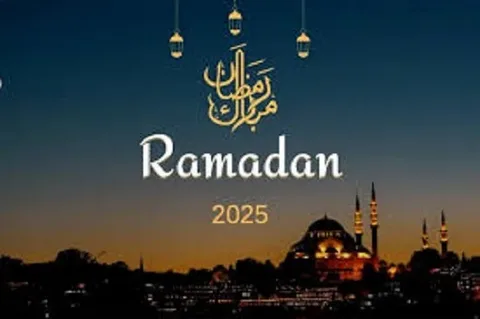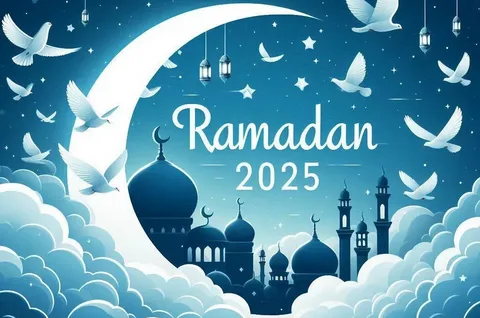As February draws to a close, many people around the world start looking ahead to significant events of 2025. Among the most important occasions for Muslims globally is Ramadan, a sacred month marked by fasting, prayer, and spiritual reflection. This article serves as a comprehensive guide to Ramadan 2025, explaining its expected dates, religious significance, customs, and how non-Muslims can respectfully support their friends and family during this holy month.
Understanding Ramadan: The Spiritual Heart of Islam
What is Ramadan?
Ramadan is the ninth month of the Islamic lunar calendar and is considered the holiest month in Islam. It commemorates the month in which the Qur’an—the Islamic holy book—was revealed to the Prophet Muhammad (peace be upon him) by the angel Jibril (Gabriel). For Muslims, Ramadan is a period of heightened devotion, self-discipline, and community cohesion.
During this month, Muslims fast daily from dawn (Fajr prayer) until sunset (Maghrib prayer), refraining from eating, drinking, smoking, and intimate relations during daylight hours. Fasting during Ramadan is one of the Five Pillars of Islam and is a deeply spiritual practice aimed at cultivating God-consciousness (taqwa), empathy for the less fortunate, and self-purification.
When is Ramadan 2025?
Expected Dates of Ramadan 2025
The exact dates of Ramadan vary each year because the Islamic calendar is lunar, based on the cycles of the moon, which is approximately 10 to 12 days shorter than the Gregorian solar calendar used internationally. This means Ramadan moves earlier each year by around 10 to 12 days.
For Ramadan 2025, the anticipated start date is:
-
Evening of Friday, February 28, 2025
And the anticipated end date is:
-
Evening of Sunday, March 30, 2025
Ramadan officially begins with the sighting of the new moon. Since moon sighting practices can vary by region, the exact start date may differ by one day depending on local observations.
The Lunar Calendar and Ramadan’s Timing
The Islamic calendar consists of 12 lunar months totaling approximately 354 days. This is why Ramadan shifts through different seasons over the years. For example, in 2025, Ramadan will fall during late winter and early spring in the Northern Hemisphere, while in 2026, it will begin approximately 10 days earlier than in 2025.
This lunar movement also means that over a 33-year cycle, Ramadan will have occurred during every season, presenting different challenges and opportunities for fasting Muslims in different climates.
The Purpose and Significance of Ramadan
Spiritual Reflection and Closeness to God
Ramadan is foremost a time of spiritual growth. Muslims dedicate themselves to deepening their relationship with Allah through increased prayer, reading and reciting the Qur’an, and engaging in various acts of worship. This spiritual renewal aims to cleanse the heart and mind, increase patience and humility, and strengthen faith.
Fasting (Sawm): A Core Pillar of Ramadan
One of the most recognized features of Ramadan is the practice of sawm — fasting from dawn to sunset. This fast includes abstaining from:
- Eating and drinking
- Smoking
- Marital relations during daylight hours
Fasting teaches self-discipline, restraint, and empathy for those who are less fortunate. It is a physical and spiritual act that encourages believers to reflect on their blessings and develop compassion for the poor and hungry.
What Breaks the Fast During Ramadan?
The fast is broken at sunset with the iftar meal, which often begins traditionally by eating dates and drinking water, followed by a larger meal shared with family and community members.
Fasting is invalidated if one deliberately consumes food or drink, smokes, or engages in sexual relations during the fasting hours.
Charity (Zakat) and Acts of Kindness
Ramadan is also a time for increased charity and generosity. The giving of zakat (obligatory almsgiving) is emphasized, alongside voluntary charity (sadaqah). Acts of kindness and helping those in need are encouraged to foster a strong sense of community and mutual support.
Family and Community Bonding
Ramadan promotes communal unity. Families and communities gather for prayers, especially Taraweeh (extra nightly prayers), and for the iftar meal. These gatherings reinforce social bonds and shared spirituality.
Self-Purification and Moral Improvement
Beyond physical fasting, Ramadan encourages Muslims to purify their hearts and minds. This includes:
- Seeking forgiveness for past mistakes
- Avoiding negative behavior such as gossip, anger, and dishonesty
- Striving for ethical and moral growth
Commemoration of the Qur’an’s Revelation
Muslims believe the Qur’an was first revealed during Ramadan. Many strive to read or listen to the entire Qur’an during the month to honour its sacredness.
Who is Required to Fast During Ramadan?
While fasting is a fundamental pillar of Islam, not all Muslims are required to fast due to exemptions granted by Islamic law for health and safety reasons.
Exemptions from Fasting
The following groups are generally exempt from fasting during Ramadan:
- Children: Typically, those who have not yet reached puberty are not required to fast.
- The Elderly: Those for whom fasting may cause health issues.
- Pregnant and Breastfeeding Women: Women in these conditions may delay fasting if it poses a risk to them or their child.
- Those Who are Ill: Individuals with temporary or chronic illnesses that fasting could worsen.
- Travelers: Those undertaking long journeys are allowed to delay fasting.
- Women Menstruating or Experiencing Post-Natal Bleeding: They must make up the missed days later.
How to Support Friends and Family During Ramadan
For those who are not fasting but wish to support loved ones during Ramadan, here are some practical tips:
Respect the Fast
- Avoid eating or drinking in front of those who are fasting.
- Be mindful about scheduling social activities involving food during fasting hours.
Encourage and Participate in Community Events
- Join iftar meals if invited, showing solidarity and learning about the culture.
- Attend mosque events or charity drives together.
Offer Emotional and Practical Support
- Check in on fasting family members, especially those who might find fasting physically or emotionally challenging.
- Help prepare nutritious meals for suhoor (pre-dawn meal) and iftar.
Tips for Healthy Fasting During Ramadan
Fasting for long hours can be physically demanding, especially when days are long or climates are hot. Muslims are encouraged to take care of their health to maintain strength and energy.
Hydration is Key
- Drink plenty of water during non-fasting hours, especially at suhoor and iftar.
- Avoid caffeinated beverages which can increase dehydration.
Balanced Nutrition
- Focus on nutrient-rich, slow-release foods such as whole grains, lean proteins, fruits, and vegetables.
- Avoid excessive fried or sugary foods to prevent energy crashes.
Rest and Exercise
- Get adequate rest and sleep to maintain energy.
- Engage in light exercise rather than intense workouts during fasting hours.
Common Questions About Ramadan
Can medications be taken during fasting?
Generally, medications that require ingestion during fasting hours invalidate the fast. However, some cases may require special rulings, so individuals should consult knowledgeable religious authorities and healthcare providers.
What happens if someone accidentally breaks their fast?
If one unintentionally eats or drinks, the fast remains valid. Intentional breaking requires making up the missed day after Ramadan.
Is it obligatory to fast every day of Ramadan?
Yes, adult Muslims who are healthy and able are required to fast every day of the month. Missed fasts due to valid reasons should be made up later.
Conclusion: Embracing the Spirit of Ramadan 2025
Ramadan is a profoundly spiritual time that transcends fasting. It is a month for Muslims worldwide to strengthen their faith, renew their commitment to kindness and charity, and reconnect with their communities and families.
With Ramadan expected to begin on the evening of February 28, 2025, Muslims will once again embark on a journey of self-purification, prayer, and reflection that unites millions across the globe.
Whether fasting yourself or supporting loved ones who are, understanding the significance and practices of Ramadan fosters respect, compassion, and solidarity across diverse communities.
- Natural Lip Filler – Elegant Lip Enhancement & Subtle Lip Augmentation - December 19, 2025
- Lip Augmentation in London – Lip Filler London & Natural Lip Enhancement - December 16, 2025
- Bonnie Blue secretly filming huge C4 show which will reveal ‘what her life’s really like’ after 1,000 men sex stunt - June 5, 2025






